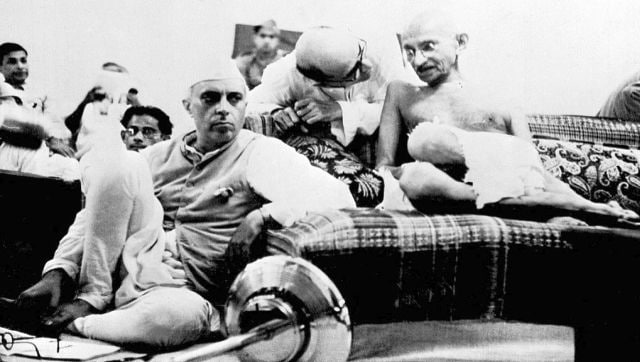“Long years ago we made a tryst with destiny, and now the time comes when we shall redeem our pledge, not wholly or in full measure, but very substantially. At the stroke of the midnight hour, when the world sleeps, India will awake to life and freedom. A moment comes, which comes but rarely in history, when we step out from the old to new, when an age ends, and when the soul of a nation, long suppressed, finds utterance.” - An excerpt from Jawaharlal Nehru’s Tryst of Destiny speech
Just before the clock struck midnight on 14 August, 1947, on the eve of Independence, Jawaharlal Nehru gave his ‘Tryst with Destiny’ speech. This came to a special session of the Constituent Assembly of India, the body of representative Indians working towards a new constitution, met for its fifth session at 11 pm. The meeting was chaired by first President Rajendra Prasad. India’s first prime minister – Mahatma Gandhi’s successor at the helm of the Independence movement – would deliver in Independent India’s Parliament what would become known as an iconic speech marking the beginning of a new era. Let’s take a closer look at the ‘Tryst with Destiny’ speech, widely acclaimed as one of the greatest speeches of the 20th Century and some reflections on it from experts. As this piece in Times Now noted, Nehru liked to craft his own speeches.
“The ‘Tryst with destiny’ speech was signature Nehru, crafted by his own hands,” the piece noted.
“Unlike the prime ministers who came after him, Nehru was generally disinclined towards the idea of his speeches being written by someone else. Though he was compelled to take help in his speeches in his long tenure as prime minister, especially while delivering to a foreign audience (every turn of phrase counts in international relations), many of the speeches were his own,” the piece noted. [caption id=“attachment_10137231” align=“alignnone” width=“640”]  File image of Jawaharlal Nehru. News18 Hindi[/caption] The piece added that Nehru’s private secretary MO Mathai would complain that the prime minister spent too much time “in dictating letters and drafting or dictating statements and speeches”. As the University of Cambridge website notes Nehru studied natural sciences at Trinity College, Cambridge, aspired to a ‘socialist, secular, and democratic India’. That was reflected in the following passage: “The future beckons to us. Whither do we go and what shall be our endeavour? To bring freedom and opportunity to the common man, to the peasants and workers of India; to fight and end poverty and ignorance and disease; to build up a prosperous, democratic and progressive nation, and to create social, economic and political institutions which will ensure justice and fullness of life to every man and woman.” Reflections on the speech
Despite the stirring words of the speech, Nehru, as per the book The Diplomats 1939-1979, sounded tired and was not at peace.
As per the book: “Later, he confessed that he was haunted by a sense of inner failure at this moment of greatest triumph. Even as he delivered his historic midnight address to the Constituent Assembly, his mind was filled with images of his beloved city of Lahore in flames, another victim of the unfolding horror of Partition….” As The New York Times noted, “Those stirring words met the occasion, but had no effect on the swirling chaos on the ground as mobs sought on their own to determine the religious makeup of towns and villages. Communities that had lived together for centuries viciously turned on each other.” [caption id=“attachment_10018331” align=“alignnone” width=“640”]  Mahatma Gandhi sits with Jawaharlal Nehru, during a Congress party meeting in Bombay on 9 August 1942. AFP[/caption] As Sumeet Kaul, writing for Times Now, noted, “The speech had to both honour the sacrifices of the past that led to this moment and lay out a vision for the future, a future that still had to be written as a country, a civilization took re-birth. It had to belong to the present and the future.”
Kiran Mohandas Menon, reflecting on the speech in 2019, wrote in The Diplomat, wrote that it gave us a glimpse at Nehru at his most eloquent.
“How much of the “Tryst With Destiny” Nehru referred to on that midnight hour in 1947 has been redeemed remains open to discussion. India still remains young and confident — and most importantly democratic – but stark inequalities also exist. How much of that progress or the lack of it remains to the credit or fault of its first prime minister, described by Vallabhbhai Patel as the “leading light, in the twilight preceding the dawn of independence,” is also a relevant question. That debate will continue. And such is Nehru’s contribution to setting up the institutions that allow and further this debate that it cannot continue without him being invoked and reassessed time and again.” Nehru ruled India for 17 years and died of a heart attack on 27 May, 1964. With inputs from agencies Read all the Latest News , Trending News , Cricket News , Bollywood News , India News and Entertainment News here. Follow us on Facebook, Twitter and Instagram.


)

)
)
)
)
)
)
)
)



